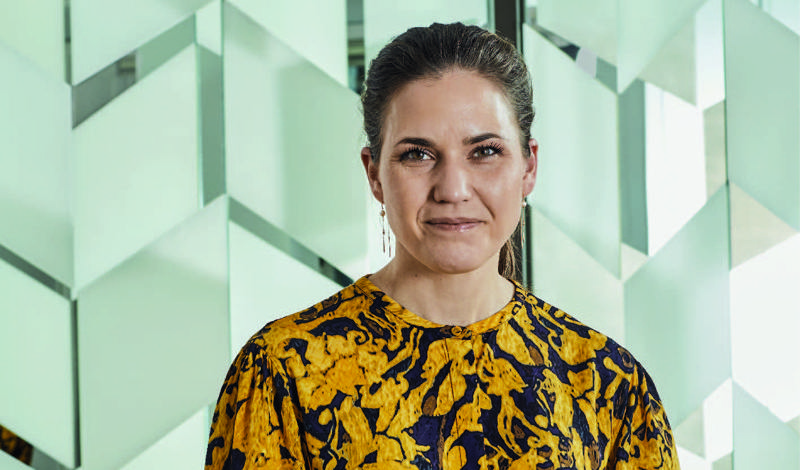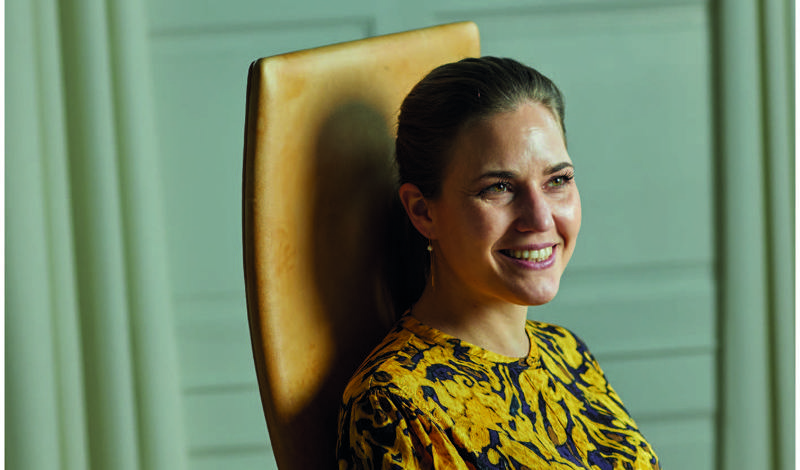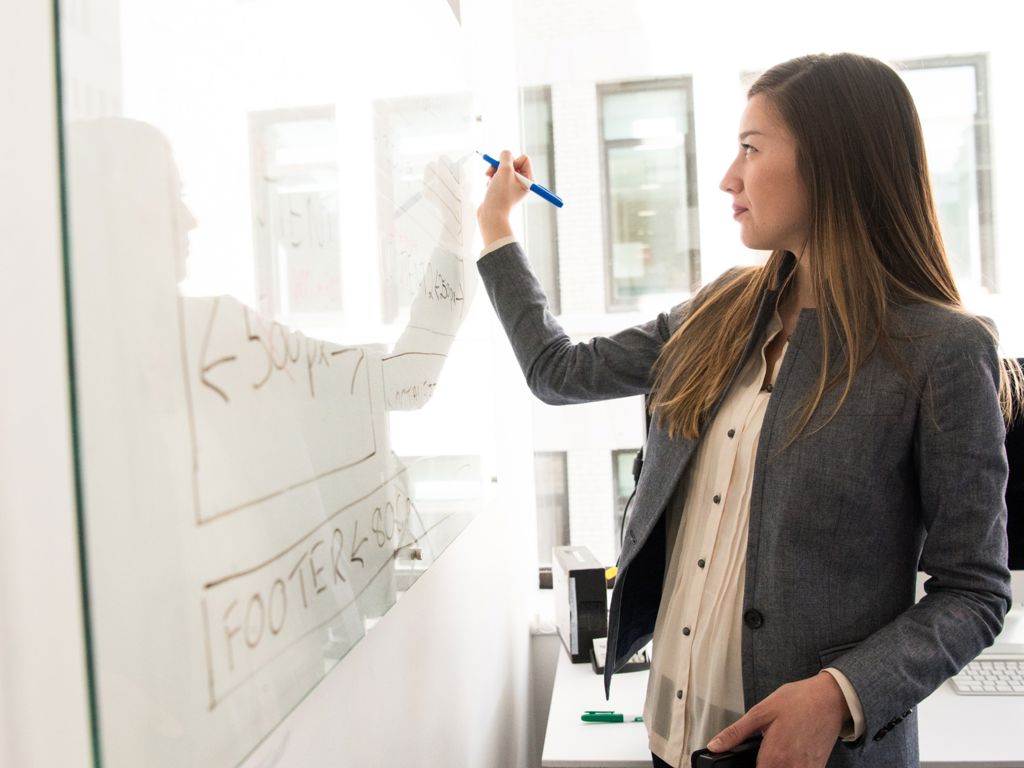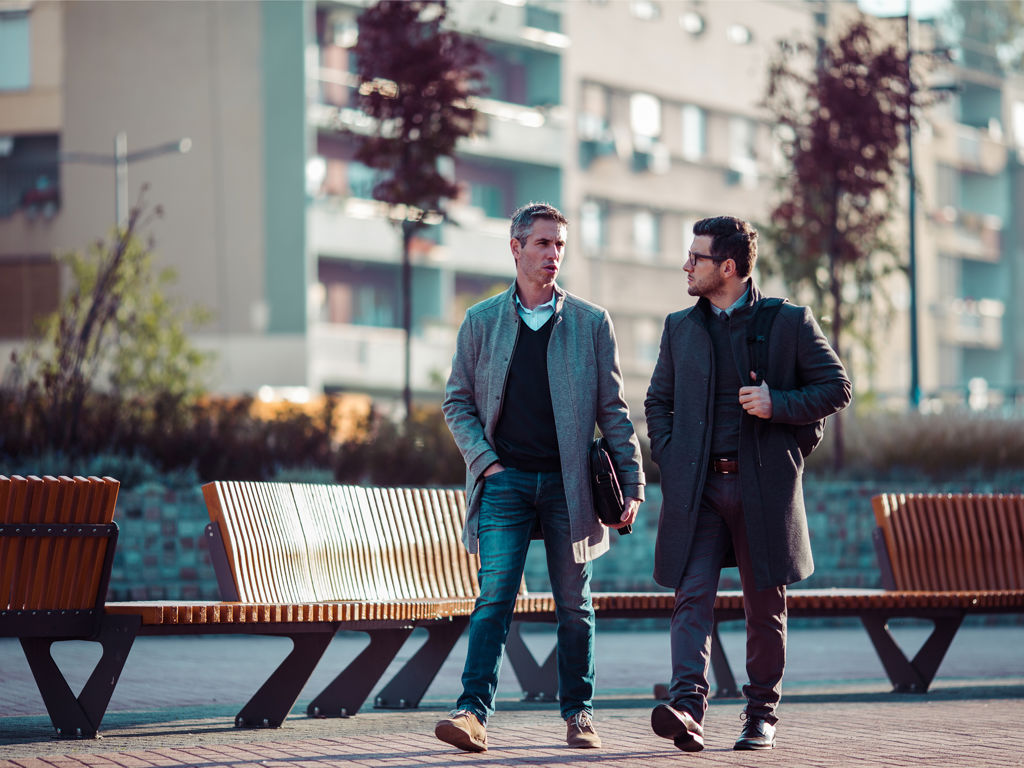New minister for digitalisation calls for more focus on the regulation of employee data
Finansforbundet has for several years advocated for a minister for digitalisation, and the SVM government has appointed Marie Bjerre from the Liberal Party as Denmark’s first minister in the area. She intends to put possibilities in the fast lane, while ensuring that neither the trust in digitalisation nor the rights of people are weakened.
Four white moving boxes filled with A4 paper sit under the staircase in the reception hall. A sheet of paper with numbers on it is stuck on the side of each box. Two of them will soon be going to the third floor. Beside them, a trolley with eight boxes of HP computer screens is waiting to find an office and owner somewhere in the building.
Until very recently, the building on the corner of Stormgade and Frederiksholms Kanal with Christiansborg lurking just a few hundred metres away was home to the Ministry of the Interior and Housing. But when piecing together the huge jigsaw of cabinet ministers, a new ministry saw light, the Ministry of Digital Government, which is now settling into the building.
The appointed minister is the Liberal Party’s 36-year-old Marie Bjerre whom many consider a key figure in the future of the Liberal Party. But she wasn’t too sure of what the post entailed.
“To tell you the truth, I did have some questions to ask him, like: ‘Minister for Digitalisation’? What’s that? What does it imply?
She has a smile on her face when she tells the story. When the phone rang way past most people’s bedtime on Wednesday 14 December last year, and Party Leader Jakob Ellemann-Jensen was on the other end, it wasn’t crystal clear to her what the post implied from its title alone.
“I think I asked him so many questions, which made him ask me if I needed time to think it over. I told him I didn’t, but that I needed to know what I was saying yes to exactly. And I also told him how very exciting it all seemed to me.”

Foto: Jasper Carlberg
Ethical dilemmas
Finansforbundet and several other trade unions, business organisations and companies have for several years been advocating for a separate digitalisation portfolio. Denmark is one of the world leaders in digitalisation, and the development is both rapid and extends in many directions.
This puts many areas of legislation under pressure, because it prevents developments that help us become better, more skilled and faster. But digitalisation and increasing volumes of data also give rise to insecurity and uncertainty about how all this knowledge is used about us – or against us.
“The pressure for establishing a separate ministry has been intense. The reason why we have established it is to put a separate focus on this particular agenda and to ensure progress and momentum. Digitalisation holds a lot of opportunities since it is no longer just a technical agenda or an optimisation agenda placed in the Ministry of Finance, it’s an area of its own,” says Marie Bjerre.
She emphasises that the dilemmas, data ethical issues, monitoring and digital literacy that digitalisation also comprises are a political responsibility.
“I can have an important voice in these themes and get involved in the debate. We will also see more regulation from the EU in which Denmark will need to have a strong voice”, she adds.
Young minister with long experience
Marie Bjerre is 36 years old and born and raised in Rødkærsbro, 10 kilometres southbound on route 26 between Viborg and Aarhus in Jutland. She has been politically active in both lower and upper secondary school before party politics pulled her away from student politics.
Over a five-year period, she was first chairman of the Liberal Party’s youth organisation in Viborg and, during law school in Copenhagen, she sat on the youth organisation’s National Governing Board and Executive Board. She then served as Political Assistant, firstly to Troels Lund when he was Political Spokesperson, secondly to Jens Rohde, Member of the European Parliament in Brussels.
In 2016, Marie Bjerre was drawn to politics again and ran as a Liberal Party candidate for the Danish Parliament in the district of Himmerland of the North-Jutland constituency, winning 8,627 personal votes in 2019. In 2022, the number of votes increased to nearly 10,000.
“We shouldn’t fear the possibilities”
Marie Bjerre explains that she has an open, international and liberal view of the world – a line that she sees fine possibilities of taking forward in the digital time age.
“Digitalisation enables us to do many things. When the ministry was handed to me, I named myself Minister of Possibilities, Søren Pind style, you might say, (editor's note: Mr. Pind named himself Minister of Freedom), for there are so many opportunities in digitalisation, with even more to come. It is really a very liberal view of the world that you are not afraid of development but that you seize it and believe in allowing businesses to give people who are skilful the opportunity to also use this development.
But she also mentions the downside of all these possibilities. It is about protecting our citizens and paying regard to the individual, which in the minister's view is absent in the debate.
“I want to be an active voice in the debate when it comes to monitoring systems, because there are several delicate balancing acts to make when we talk about digitalisation. On the one hand, we need to be able to trust digitalisation and make it safe, on the other, I am very concerned about what is possible in the monitoring of employees. We have seen trends of detailed information being obtained at employee level, or information on how much time you spend on reading an email. It is important that we also show political interest in ensuring a proper regulation.”
“We need to focus more on what type of data is being collected, and I consider it absolutely crucial that we continue to have full control over it, so we can trust our digitalisation.”
Digitalisation will become what climate once was
A concern that is voiced regularly is data collection and the use of data. In Denmark, it is common practice for private sector businesses to solve major tasks in the IT field; just as common are stories of systems that break down with great inconvenience to the healthcare sector, for example, systems that exceed the budget, or systems that simply do not work as intended.
Marie Bjerre emphasises several times that the interaction between the private and public sectors must be strengthened, but that we must “never digitalise for the sake of digitalisation”.
The minister finds it “crucial” that the Danish state owns the critical infrastructure, as we know it from the energy area. Then, private businesses should solve the individual tasks under it. This requires a new view on large parts of public regulation.
“In relation to this regulation, I hope that you will feel the change of having a minister in the area. For example, I think it works very well with MitID and the banks, in which a public-private collaboration has succeeded in finding common solutions that benefit employees, customers and businesses. In the energy area, the state owns the supply lines, but private enterprises can set up wind turbines or construct solar parks. They are better at this, and it encourages competition, giving us the best solutions for all. This is a direction that I would like to continue in digitalisation,” explains Marie Bjerre.
If, in ten years’ time, we can look back and say: “It was a good decision to have a minister for digitalisation”, what would be the good example derived from establishing the ministry?
“I hope it is not thought of as something special. That it was a quite natural step to have a minster for digitalisation. Other European countries have such a minister too, the reason being that digitalisation has become such a big part of our world, which makes it completely natural to have a minister in this area. I compare it to when we got a climate minister 16 years ago. It may be true back then that sustainability and circular economy were something special, and that is was something that the individual ministries focused on. Today, it is impossible to imagine a government without a climate minister, and I think the same about digitalisation.

Foto: Jasper Carlberg
About: Marie Bjerre
- 36 years old, grew up in Rødkærsbro in Central Jutland.
- A maths student from Viborg Katedralskole (Viborg Cathedral School) in 2005 and upper secondary school student in Viborg.
- Master of Laws (cand.jur.) from the University of Copenhagen in 2011.
- She has always been politically active. First, in her student life as National Secretary of the National Union of Danish School Pupils, then as Education Policy Secretary in the Union of Danish Upper Secondary School Students and later as Chairman of the Liberal Party’s youth organisation in Viborg and member of the youth organisation’s National Governing Board and Executive Board.
- In the period 2005 to 2012, she first filled the position as Student Assistant for the Liberal Party, then as Political Assistant to Troels Lund, former Political Spokesperson of the Liberal Party and later to Jens Rohde, Member of the European Parliament.
- Marie Bjerre has worked as a legal assistant in Brussels, as a lawyer and attorney at law in Aarhus and Aalborg and has a Master’s in International Law from the USA in 2016, the year she also ran for the Danish Parliament as a member of the Liberal Party in the district of Himmerland.
- In 2019, she was elected to the Danish Parliament and has held several positions as spokesperson up until her appointment as minister.
- She lives in Aalborg with her husband Jan and their two young daughters.





